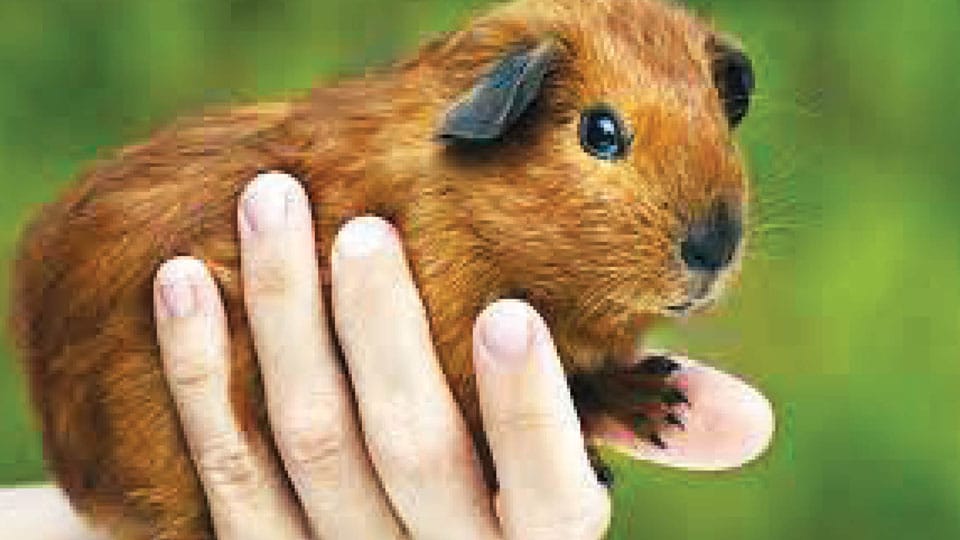In this week’s Pet Talk,
Maneka gives tips on how to look after guinea pigs’ health
Can we not have a cage for guinea pigs? Can they roam freely?
Before you decide to let your guinea pigs loose in the house, you need to make sure they are adequately trained to use the litter box. Untrained pigs can make a mess in your home by excreting whenever and wherever they want. While it may not seem as too much trouble for you to clean up the visible spots, the many unreachable corners of the house may pose a challenge. This can often lead you to being frustrated with your pets. Avoid this issue by training your guinea pigs to use the litter box properly before setting them loose.
Simply get a litter box for their cage and put a few droppings inside it to let them have an idea of what it’s for. You may have to do it for a couple of days before your pets pick up on the idea and start using the litter box. Once you see them use the litter box regularly, you can allow your guinea pigs to roam free in a particular room, with their cage in access so they can get to the litter box when the need arises. When you are sure that they return to the cage every time to use the litter box, you can give them more access to the other areas of the house.
Guinea pigs really enjoy running around in the green. If you allow them to roam free in your backyard or garden, you will notice their excitement through their wildly playful movements. Before you take them out, make sure your garden does not have any toxic plants. Guinea pigs like to nibble on plants, and toxic plants pose a threat to their lives. Also, guinea pigs need places to hide, as well as places where they can soak up sunlight. Such places help them maintain their body temperature.
Still water and water from sprinklers are also dangerous for them. If they get too drenched, they become vulnerable to diseases like hypothermia which can at times be fatal. Another thing to take a note of, before letting your guinea pigs free in the garden, is to set up water bowls for them.
They need access to plenty of fresh water while playing and running around. But make sure the bowls aren’t too deep, or your guinea pigs could drown themselves.
How do I clean the cage of my guinea pig?
When you clean the cage, put down a thin layer of baking soda before you put the first layer of bedding.
Soak the fleece in one-part cleaning vinegar (white) and one-part lukewarm room temperature water overnight — or at minimum 12 hours — then wash in warm or cold water and allow to air dry. Do NOT use artificially scented laundry detergent.
If your pig is filthy, and maybe needs a haircut and nail trimming, take them to the vet for a haircut and a trim, then keep up routine maintenance from there. But I am not sure most vets know anything about guinea pigs.
Should guinea pigs be spayed if you have a pair?
The best room-mates are a neutered male and an unspayed female. Never spay a female because the operation is too hard on her. It is better to neuter the male because it is a very easy operation for them, and it solves male behavioural problems of being over aggressive to other males and to females.
Do guinea pigs need a friend?
Never keep one alone. More is better, if space allows it. The bigger the cage, the better. Males will do fine together, unless females are present. When you introduce guinea pigs to each other, almost always there is some bristling and jockeying to decide who will be boss pig, and then they settle down and are pals. They are extremely social creatures. They talk to each other all day, set out on missions and adventures together. They are wired to live in little herds. They are not solo animals.
How can I help guinea pig to relax with handling?
In order to help your guinea pig relax, the best thing you can do is to hold it properly and hold it often. Make sure you have a firm grasp of your guinea pig and make sure that you are able to support its belly, you don’t want anything dangling when it comes to body parts.
Secondly, a lot of the time, the more you hold your guinea pig, the more comfortable it is going to get. It’s just like anything, the more often you do it, the better the sense of familiarity. Sit when holding it and place it inside a blanket on your lap. Guinea pigs especially like fleece, which is soft and comfy.
What should I do my guinea pig is sneezing and is sensitive around his stomach, but he is eating and drinking normal.
Check the insides of his front legs. Guinea pigs tend to wipe their noses and mouths on the insides of their front legs. Check for discharge. If there is discharge, take him to the vet. If not, it was probably just something he ate. Make sure everything you are feeding him is guinea pig safe. If he doesn’t improve, take him to the vet.
Why won’t my guinea pig stop running circles at night?
While leaping and fast running can mean your guinea pig is content, they also can mean he’s in terror mode. If something scared him suddenly, you might see him jump and run around in irregular patterns. He might give off a lot of piercing squeaking sounds while he’s doing this, too. Many things can trigger such nervous behaviour, whether unfamiliar surroundings, abrupt motions or jarring sounds from outside.
Speedy running in guinea pigs can sometimes also be an indication of health issues; perhaps fur mites. Some typical indications of fur mites, apart from running around quickly, include loss of weight, greasy or dry patches of skin, itching and missing clumps of fur.
If you think your guinea pig’s fast running is driven by terror, monitor him. When guinea pigs are in heightened fear modes, they often neglect to notice things that are going on around them. Yours might run so fast that he hits his body against the wall of his enclosure. He might even collide with one of his cage mates, which could lead to injuries to himself or to the other party. When guinea pigs participate in persistent running due to fear, they often do so until they become extremely fatigued.
Can guinea pigs eat fruits?
Guinea pigs can eat a small amount of strawberry occasionally and in moderation. But whether your guinea pig will eat them is another thing. Every guinea pig has its own taste for food, just like humans. If your guinea pig does love fruit, he/ she might try to beg you for more helpings. Be strong and offer him/ her only a small quantity, like a couple slices, once or twice a week. There are lots they can eat, but they should be fed sparingly due to the high sugar content. Fruit is a treat for your guinea pig, and should not be a staple of their diet — it’s like cake or cookies for guinea pigs. Just like your health will decline if you had a piece of cake with every meal, a guinea pig will get sick and decline if they get too much sugar in their diet.
Most fruits would be fine. Do not feed them the seeds of fruits, because if there are any poisons, they will likely be in the seeds. For instance, an Apricot seed, or kernel, contains a toxic chemical known as amygdalin. In the body this chemical is converted to cyanide, which is of course poisonous. The fruit itself, without the seed, is fine.
What veggies can guinea pigs not eat?
It is unwise to feed them potatoes. The only part of the potato that contains any Vitamin C is the peel. Potatoes with sprouts are dangerous, as potato and tomato contain a poison called solanine.
No leek, onion, chive, garlic, shallot, as they all come from the same family of plants. Soya and some other beans are poisonous if fed while raw as they contain a substance called lectin, which in humans cause stomach pain or nausea in 1-7 hours. It also doesn’t contain any Vitamin C.
Rhubarb contains an acid called oxalic acid. The leaf has this acid, and the stem is filled with this acid, which causes kidney failure or kidney stones. It’s therefore not a good food for guinea pigs.
How often do guinea pigs need to be fed?
Full time. Keep their bowls filled, and stash a pile of hay whenever they eat it all.
Guinea pigs eat all day. Their long digestion tract, and time-consuming ingestion, makes room for plenty of plant material. And they need lots of it.
Which vegetables should be fed to guinea pigs? How do I keep variety without the food going bad?
Guinea pigs are herbivores. That means that they just eat fruits and veggies — no dairy, eggs, meat, or insects. Fresh hay and fresh leafy vegetables should make up the bulk of your guinea pig’s diet. The pellets should include Vitamin C to keep your pet healthy. It’s important to give your guinea pig something fibrous to chew on. This is where hay is very important. They munch on hay and veggies all day. That means it’s important to keep fresh food available constantly. It’s best to dispose off your guinea pigs’ food and water every day, clean the bowls, and replace with fresh food and water.
Can guinea pigs eat nuts and raisins?
Guinea pigs shouldn’t eat too much saturated fatty acids (present in peanuts) or sugar (present in raisins). Guinea pigs have a stomach that can easily be upset. Saturated fatty acids are the foundation of a high cholesterol level (increased risk of cardiovascular diseases) and sugar isn’t good for the teeth and is converted into fat. A raisin once in a while shouldn’t be much of a problem, and they’ll love it! But peanuts might even give a suffocation risk.
Are guinea pigs more prone to being overweight as they get older?
Guinea pigs are more prone to weight gain as they get older. Be very careful by not giving them too much food, especially after age three. Overfeeding pigs is easy to do because, when your pets realise that you have become the primary caretaker and do the feeding, they will squeak at you, as soon as you enter the room, to greet you. They also become very noisy as soon as you open the refrigerator. The temptation to give them many treats is high because they enjoy eating so much, and you will see that food makes them very happy. Unintentionally you end up giving them too much and they can develop a weight problem and/ or diabetes.
Why is my guinea pig losing weight if he is eating normally?
If he is truly eating normally but losing weight, it could be a feed problem if you have changed his diet recently. Your guinea pig may have a tooth problem. Possibilities are teeth overgrowth, tooth abscess, or other dental disease, or tumours, kidney disease, and other types of infections.
Make sure you are giving him/ her lots of timothy hay, as well as chewing items. Guinea pigs also need their nails trimmed once a month. If the nails are too long, this could cause pain and he/ she may not feel like eating. Guinea pigs are also prone to diabetes, respiratory problems, as well as depression.
How do I know if I am over-feeding my guinea pigs?
A guinea pigs’ diet should include 80% hay, 15% fresh vegetables and herbs, and 5% of commercial pellets. Overfeeding can be damaging to your guinea pigs’ digestion tract, and cause obesity. To prevent yourself from overfeeding your guinea pig, all you need to do is serve your guinea pigs the right portioned meals and cut down on unnecessary sugary treats.
Pea flakes are a better store-bought alternative to other commercial treats, but should still be kept to a minimum.
If you’re unsure on how much you are feeding your guinea pig, it’s best to monitor the quantity by measuring it. Obtain a kitchen scale and a measuring cup. Pellets can be measured via a quarter of a cup or 1/8. Vegetables may be a bit harder to measure as they cannot be measured in liquid form. Instead of measuring one cup, weigh the vegetables.
How do I get my guinea pigs to gain weight?
One investment, that everyone with small pets should make, is a kitchen scale with values of grams and kilos. When illness is suspected, weighing the animal daily can be a critical step to determine if an emergency vet visit is warranted. In general, a healthy guinea pigs’ weight is cited as: 900-1200 grams for males; 700-900 grams for females.
It might seem counterproductive, but you don’t want underweight guinea pigs to gain immediately. Any changes in their body weight must be gradual so that their bodies can adjust properly. It is also very difficult to get adult pigs to gain weight that they’ve lost. Do not try to force the process by overfeeding certain items. A guinea pigs’ weight will eventually settle to a healthy range, if they are getting the proper nutrients and their health problem is being properly addressed.
Always provide unlimited access to hay for your guinea pig, whether it is healthy or sick. This is the staple of their diet that aids digestion and keeps their teeth at the proper length. Timothy hay, orchard grass, meadow hay, and botanical hay, are some of the most common varieties used for healthy guinea pigs.
If you aren’t feeding fresh vegetables daily, now would definitely be a good time to start if your guinea pigs need to gain weight. It is recommended that they have 1 cup every day, as it provides essential Vitamin C.
As Vitamin C content is important, pellets can be a good source of this, but Vitamin C content can degrade over time. Some brands offer stabilised Vitamin C; be sure also to check the expiry date.








Recent Comments